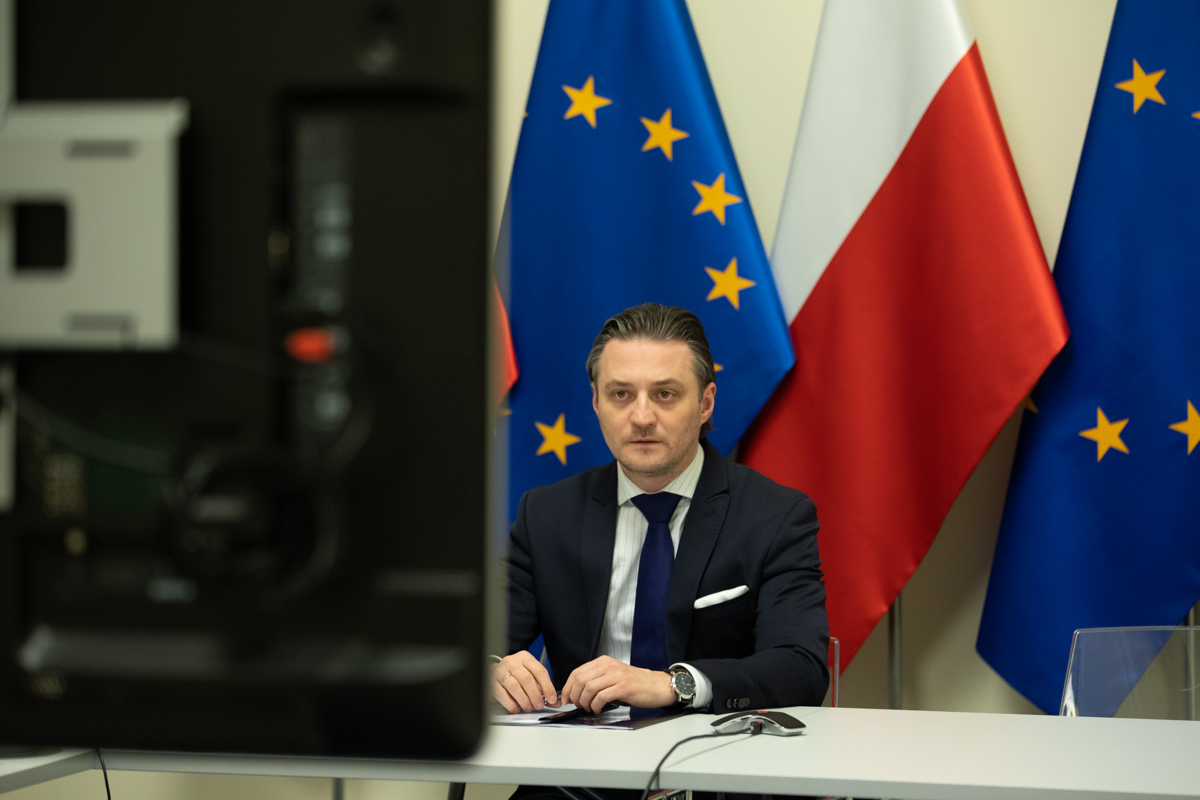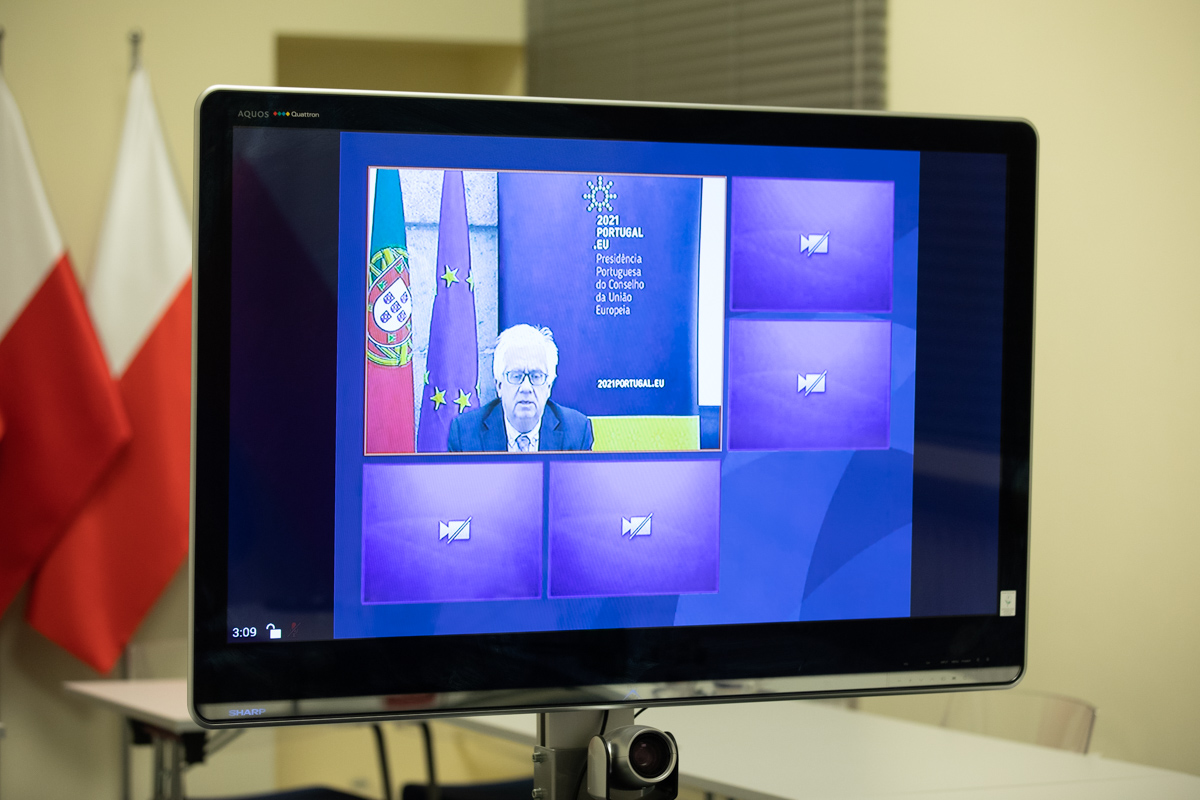Polsko-portugalskie konsultacje dotyczące polityki migracyjno-azylowej UE
11.01.2021
W poniedziałek (11 stycznia br.) Bartosz Grodecki, podsekretarz stanu w MSWiA przeprowadził rozmowę z Eduardo Cabritą, ministrem spraw wewnętrznych Portugalii. Były to pierwsze konsultacje w ramach zainaugurowanego 1 stycznia br. półrocznego przewodnictwa Portugalii w Radzie Unii Europejskiej. Podczas rozmowy omówione zostały najważniejsze plany prezydencji w obszarze spraw wewnętrznych, w szczególności w odniesieniu do przyszłej polityki migracyjno-azylowej Unii Europejskiej.

Nawiązując do przekazanego w grudniu 2020 r. na ręce prezydencji niemieckiej, Portugalii (jako przyszłej wówczas prezydencji) i Komisji Europejskiej wspólnego dokumentu koncepcyjnego - wiceminister Bartosz Grodecki zaprezentował prezydencji stanowisko Polski, państw Grupy Wyszehradzkiej oraz Estonii i Słowenii w odniesieniu do Nowego Paktu ws. Migracji i Azylu. Podkreślił konieczność oparcia reformy migracyjnej na dotychczasowym kompromisie zawartym w konkluzjach Rady Europejskiej z czerwca 2018 r., ze szczególnym uwzględnieniem równowagi między solidarnością a odpowiedzialnością. Koncepcje przymusowej relokacji migrantów stanowią czynnik przyciągający do UE oraz blokują postęp w negocjacjach nad Paktem ws. Migracji i Azylu. Wiceminister pozytywnie ocenił planowane przez prezydencję Portugalii skoncentrowanie się na zewnętrznym wymiarze migracji i współpracy z państwami trzecimi. Takie podejście powinno zapewnić ograniczenie nielegalnego napływu migrantów i zwiększenie skuteczności powrotów. Należy je dalej wzmacniać i rozwijać w oparciu o wyrażone dotychczas szerokie poparcie państw członkowskich.
W odniesieniu do pozostałych priorytetowych dla prezydencji Portugalii obszarów współpracy, Polska zadeklarowała aktywny udział w dyskusji, zarówno w kontekście mechanizmów z zakresu ochrony ludności, współpracy policyjnej, czy zapewnienia prawidłowego funkcjonowania strefy Schengen.
Przewodnictwo Portugalii w Radzie UE zamierza kontynuować prace nad Nowym Paktem w sprawie Migracji i Azylu, które doprowadzić mają do stworzenia sprawiedliwego, skutecznego i odpornego na kryzysy systemu azylowego. Prezydencja postuluje wdrożenie mechanizmów, mających wzmocnić działanie i skuteczność polityki powrotowej, jak również dalsze wzmacnianie współpracy z państwami trzecimi pochodzenia i tranzytu migrantów. W celu ograniczania nielegalnej migracji i efektywnego zwalczania przemytu migrantów, prezydencja podkreśla także znaczenie efektywnej ochrony granic zewnętrznych.
***
Polish-Portuguese consultations on the future EU migration and asylum policy
On 11 January 2021, Mr Bartosz Grodecki, Undersecretary of State in the Ministry of the Interior and Administration, held a discussion with Mr Eduardo Cabrita, the Portuguese Minister of the Interior. These were the first consultations of Portugal’s six-month Presidency of the Council of the European Union, inaugurated on 1 January. The subjects of discussion were the presidency's most important plans in the area of home affairs, particularly with regard to the European Union's future migration and asylum policy.
With reference to the joint letter submitted in December 2020 to the incumbent German and the upcoming Portuguese Presidencies of the Council of the European Union and to the European Commission, Minister Bartosz Grodecki presented the position of Poland, the Visegrad Group as well as Estonia and Slovenia with regard to the New Pact on Migration and Asylum, emphasising that migration reform should be based on the compromise reached in the European Council conclusions of June 2018, with particular emphasis on the balance between solidarity and responsibility. The mechanisms of the obligatory relocation of migrants are pull factors for illegal immigration into the EU and they block progress in negotiations over the Pact on Migration and Asylum. Minister Grodecki positively assessed that the Portuguese Presidency placed an emphasis on the external dimension of migration and cooperation with third countries. This approach should allow the illegal influx of migrants to be reduced, and bring increasing efficiency of returns. It must be further strengthened and developed based on the broad support of the Member States expressed so far.
With regard to the other key areas of cooperation under the Portuguese Presidency, Poland declared its active participation in the discussion, both in the context of mechanisms concerning civil protection and police cooperation, and towards ensuring the proper functioning of the Schengen area.
The Portuguese Presidency of the Council of the European Union will continue to work on the new Pact on Migration and Asylum, which is expected to lead to a fair, effective and crisis-resilient asylum system. The presidency calls for the implementation of mechanisms that strengthen the operation and effectiveness of the return policy, as well as for the further strengthening of cooperation with third countries of origin and the transit of migrants. In order to reduce illegal immigration and effectively combat the smuggling of immigrants, the presidency also stresses the importance of the effective protection of external borders.


